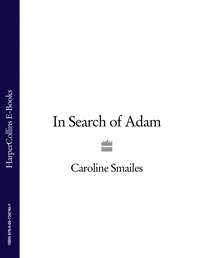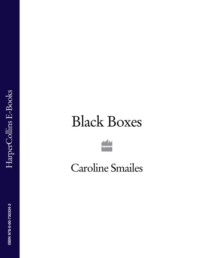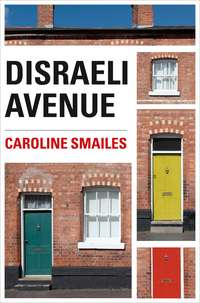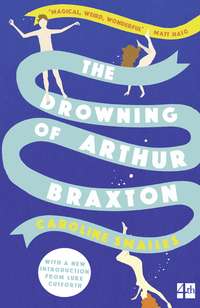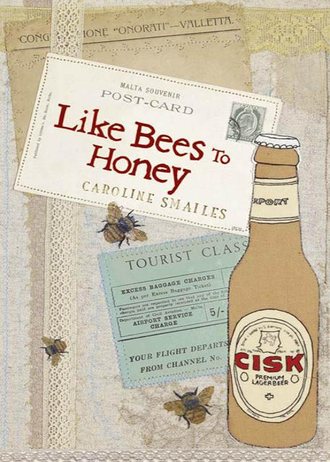
Полная версия
Like Bees to Honey
Three days ago, I thought of my daily life. I still had Christopher. I felt him, I heard his voice, I saw him. He was still there. I thought of how his coming back to me had been unexpected. At first I had thought that it was my mind playing tricks with my grief, that I was imagining his presence. But I was not, I am not. He has been back with me for two years.
It is simple. I can see my dead son and his spirit brings me peace.
Three days ago, I began to walk down the steps.
I heard my name.
Voice: Nina.
I stopped, I turned.
Voice: I am Jesus.
I expected to see, something, someone. I felt a chill sweep through me then the smell of stale alcohol covered me, enveloped me. I carried on walking, slowly. The smell travelled with me. I heard the voice, again, my name, his name.
Jesus: Nina, I am Jesus.
The voice was gravel filled, harsh, guttural. I turned, I spun. He was not there. I was standing, alone, my Lord’s tears falling onto me.
I began to descend the steps, again. The same chill swept through me, quickly, the same smell of stale alcohol covered me, stilted me. I was stunned. I stopped. The rasping voice had a familiarity, it connected, it stuck into me.
Jesus: Nina, I am Jesus.
The voice existed, without a body, there was no physical presence.
I did not move.
He spoke, again, with the same gravel-filled harshness.
Jesus: Nina, I am Jesus.
‘Stop it. Stop it,’ I shouted the words.
I held my hands to cover my ears. His voice, inside of my head, stayed at the same volume, constant, continuous, on a loop. We were talking through tin cans, connected by nothing.
Jesus: Nina, I am Jesus. You blame your Lord.
‘Stop it. Stop it. Stop it.’
Jesus: Nina, I am Jesus. I sent him back to help you. I thought he could help you.
‘Shut up!’
My knees crumbled, I fell to the steps. With my palms clutching my ears, I bowed, forwards, backwards, rocking, sobbing.
The voice was silent, minutes passed by, silence, more silence.
I waited, I lowered my hands to the step; I steadied myself as I stood.
Jesus: Go to Malta, my Nina. I am Jesus. Bring Cadbury’s chocolate with you.
Matt,
I dreamed of you last night, the ‘of you’ was in a feeling, in the sensation that it evoked.
In my dream, I was sitting at Manchester airport. I was sitting on the floor, next to that backpack of yours that you loved so much, when we were students. A shabbily dressed lady staggered over to me. She was carrying a basket of handmade lace.
She spoke to me, ‘X’temp hazin! X’temp hazin!’
I couldn’t understand her words. She spoke in my tongue. She thought that I would understand. She thought that something within me would make me understand. I tried. I tried to pick out the words, but I could not.
She spoke again, in English. ‘What awful weather! What awful weather!’ I smiled at her. She laid her sunblessed finger onto my head. She spoke in whispered tones, ‘Gara in.cident. There’s been an accident. Gara in.cident.’
I woke from my dream sobbing. You do not come to me in the night, instead you send me old women with tongues that, with darkness, I can no longer understand. They speak words that I have, that I know, that I knew, once. And all the time I am longing. I am aching. I feel that I am dying inside to out. There is no life. There is no breath. There is nothing without you in my life.
I wish that I could tell you, that I could send this, leave this, that you would begin to understand. My love for you grows, it is deep rooted within me and even if I try to deny it, if I ignore or block it, it still grows. My love matures, stronger with each neglectful day. I am truly lovesick.
But Matt, I am leaving you; tomorrow I am flying home to Malta.
Nina x
êamsa
~five
Christopher Robinson, born 20 December 1991.
Christopher Robinson, killed 5 February 2002.
Ten years old.
The plane is taxiing, gradually, searching to meet the metal stairs.
‘You look sad, Mama.’
Christopher breaks my thoughts.
‘I’m just thinking, Cic

‘About when I passed over?’
‘Yes, about when you died.’ I whisper the words.
‘I can hear you, even when you don’t speak.’
He tells me.
Speaking to my dead son helps me, to remember.
The fifth of February. It was an insignificant day, the date meant nothing. I dwell on this, sometimes. I think about how life can change, can fall, crumble with ease.
I made the wrong decision, a mistake, a split second error in judgement.
The weight of consequence is beyond measure.
I do not work, I never have. I like it that way. I love to be at home, making a home. I cook, I clean, I wait for the end of the school day.
It was the same then.
I would wait for the end of the school day, for my Cic

He still is.
Christopher was ten; he was keen to be independent, to help. He loved food, the combining of ingredients. He would watch me cook, his questions were intelligent. I would describe food, cuisine, Maltese traditions to him. He would eat up my words, my snippets of language, my customs.
I would tell him about my special place in Malta. I would tell Christopher how I used to go to a café with my mother, after school. I would describe how my mother and I would sit near to the window, how we would talk and look down onto the bay of Mellie



~Maltese flat bread seasoned with salt, with peppers, with tomatoes, with capers, with olives, with olive oil.
His eyes would light, his taste buds tang. I longed for him to savour. He never did.
I gave him words without flavour, without texture.
Sometimes, in life, we put off, we think that there will be a tomorrow.
We are told that we will blossom and then wither.
I guess that I gave my son the skeleton, the remains of a culture. I spoke an outline of a country that he was drawn to, that he needed to understand. I offered him words without images that he could attach to. I lacked commitment; I feared the joining of him to his roots, my roots. I barely spoke with my mother tongue, not until after Christopher’s death, not really.
We lived close to the primary school. Christopher pestered to walk home with a friend. He would have to cross one main road, but they knew where to look, how to look left and then right and then left again. They were sensible boys, I gave in. They had managed the walk home for six, maybe even seven weeks.
School finished at 3.20 p.m.
On 5 February 2002, Christopher’s friend James was ill. His mother had called in the afternoon, just to let me know that Christopher would be making the walk home, alone.
I began to worry.
I decided that I would wait for him, on the home side of the main road; that I would almost pretend to be shocked to see him.
It was a simple plan.
I got to the main road at 3:20 p.m. I stood down slightly, out of sight, almost, as if I had come up from the village and was making my way home. Christopher had not seen me. He was standing at the opposite side of the main road, waiting to cross.
I called his name, shouted out Cic

He looked at me, a huge grin on his face.
And, then, he stepped out onto the main road.
He was killed on impact.
There was nothing that I could do.
But that is not the complete story of our relationship, not really. Christopher knows that my recall lacks context, depth, texture. That is the story that I have formed, developed to convince people to offer sympathy, to empathise. There is a truth, blocked, hidden where only the spirits can see. There was another side to our mother and son relationship.
Sitta
~six
Malta’s top 5: About Valletta
* 1. The Knights of St John
Valletta is indebted to the Order of the Knights of St John, who originally designed the city as a sanctuary to tend to wounded soldiers during the defence of Malta against the Ottoman Empire in the sixteenth century. Before this, the order was situated in a little watchtower, named St Elmo, the only construction on Mount Sceberras, which lies between two harbours. The valiant conqueror of the Great Siege, Grand Master La Valette, understood that for his order to uphold its grip on Malta they would have to build sufficient fortifications. A plan was devised for the fortified city which was given the name Valletta, in honour of La Valette.
The air steward’s voice is monotone, floating over the bustle of the tourists.
‘Please stay seated until the aircraft is stationary.’
They do not, of course.
within the minute the click.
~cl – ick.
~cl – ick.
~cl – ick – ing.
of metal is heard.
People stand, push into the aisle, pull coats and bags down from the overhead lockers.
The stairs are being attached. The door opens.
I squeeze into the queue in the aisle, clutching my handbag and my shawl to my chest. Christopher follows, pinching in behind me, invading my personal space, again. We do not move.
I am impatient.
I want to be off the plane, I need to be in the open space, breathing in the dust of Malta. I want to scream. I want to tell the tourists to move out of my way.
We begin to move.
We take small steps, we shuffle; I do not let other passengers step in front of me. I avoid eye contact. I ignore the pregnant woman, I ignore the goodbye from the air steward; I walk down the metal steps.
the heels of my boots clip clap.
~cl – ip.
~cl – ap.
~cl – ip.
~cl – ap.
but there is no blast of heat, no warmth from my Lord’s smile, not today.
the heavens are spitting, spatting.
~sp – it.
~sp – at.
~sp – it.
~sp – at.
I lift my face up to creation. The sky is grey, sullen, moody.
His rain falls onto me. He spits on my face.
My Lord blesses my soul.
Mer

~welcome.
I walk in my Lord’s spit, following the trail of people, staying in between the yellow guide lines that direct into arrivals. We are close to the terminal, no bus is needed.
I hear the engines thrusting their whirs.
they whirl.
~wh – irrrr.
~wh – irrrr.
~wh – irrrr – llll.
The airport is calm, quiet. I wait for my suitcase to churn around on a conveyor.
I feel a chill. I shiver shiver, shiver shiver.
My bones are cold.
The airport smells of popcorn.
I am hungry; the sweet airport air has increased my need. I cannot remember when I last ate. My stomach churns. I am famished in Malta.
I lug, I wheel my suitcase. I do not collect a metal trolley.
I walk through customs, nothing to declare, I step onto the escalator. I travel down, slowly. I look onto the crowd that stands waiting for people to arrive. My eyes search, in vain.
I walk, I stagger through the crowd and out, into His rain.
I queue for a taxi.
Christopher follows, several steps behind me. He does not speak.
We are in a taxi, going to Valletta, my suitcase is in the boot. It will take twenty-five minutes, I think. We are going to my mother’s house, home. I dwell on the word home.
I long for a home.
I watch through the taxi window; the island rushes, blurs past my eyes with colours, with whites, with greens. The sandstone constructions are greying through the drizzle, they look weary, lost. I watch cars slip and slide past us, some are shiny, promising wealth and importance; they dance in the rain. We travel along a new road, an unknown journey. I search for familiarity, I need familiarity. I could be anywhere, any Mediterranean country, any foreign soil.
I seek acquaintance, for something to connect me to my roots. My eyes rest on golden arches, McDonald’s.
Time has altered my island.
‘John Lennon lives in Malta.’
My son says. I laugh, ha ha ha.
‘Oh Christopher! Who told you that?’ I say.
‘Jesus did.’
My son tells me.
‘I’m hoping to meet with Jesus,’ I say.
The taxi driver looks in his rear-view mirror, his dark eyes meet with mine. I smile at him, I raise one eyebrow. He looks away, quickly, back to the road.
‘Geordie shares Cisk with him in Larry’s bar.’
~Cisk lager was first available in Malta in 1928. It has an alcohol content of 4.2 per cent.
‘Geordie?’ I ask.
‘Elena’s husband.’
‘Elena?’ I ask.
‘Geordie’s a spirtu, a spirit, like me. He’s waiting for Elena to pass over. She’s your mother’s aunt, lives in Newcastle.’
Christopher is right. I recall, the words connect, ignite.
I have heard the stories of Elena, the family shame, the ostracism. She met Geordie, an English soldier in Malta, during the war. The family rejected her union. I do not know the full story. I know only fragments.
‘Geordie told me Jesus sent me back to help with your grief.’
My son breaks my thoughts.
‘Well his plan backfired, didn’t it?’ I say. ‘And I’ll tell him so when I see him.’
The taxi driver tuts.
Christopher does not speak for the rest of the journey. We travel in silence. The taxi driver switches on the radio; it crackles, interference. I hear a voice, loud, clear, through the rustles, through the static.
Jesus: Welcome home, my Nina.
The taxi driver does not speak.
I am unsure if my mother knows of my arrival. I suspect that Christopher may have told her. He tells me that he visits her, often.
He tells me that he can do that.
He says that he can be with different people, in different places, at the same time.
He tells me that he is like God, but very different. He tells me that he is like God because God can also be in so many different places at the same time.
I believe in Christopher more than I believe in my Lord.
The taxi drops us outside of the walls of Valletta. The driver keeps his eyes down as he speaks of the money that I must pay.
I fumble with my purse, with my euros.
The taxi driver does not move from his seat. He presses, something, inside of the car. There is a click. The boot springs open, slightly. The taxi driver waits, in his seat. I struggle with the boot of his car and then with my suitcase.
Christopher has not the strength to help me.
I wobble with my suitcase.
~cl – ip.
~cl – op.
across the bumpy pavements.
I am clumsy, I walk.
I walk through the City Gate and into Valletta, il-Belt.
~the City.
My heeled knee-length boots feel awkward, clumpy.
The roads and the pathways of my Capital, of Valletta, are uneven. I wobble over them; I am cautious, fearful of falling. Malta could never be smooth, perfect without blemish, there is too much history, there are too many marks, injuries, scars. Today, I am fearful of the cracks swallowing me.
I walk, gracelessly, slowly, as the Renaissance streets open up before me.
I.
~cl – ip.
~cl – op.
along the side of the road, pulling my suitcase behind me, watching my son lead the way.
Last time I walked these cobbles I was with Matt and with my five-year-old Christopher. The memory stings. I remember our walking through the City Gate and into Valletta. I remember the blistering warmth. I remember that Christopher was tired, the early morning journey and the high temperature were taking their toll. I remember Christopher was dragging behind us, no hand to hold, no comfort to be found. I remember Christopher asking me why the Opera House was broken. I remember ignoring his question, walking up again, then down again. I remember that it was busy, packed with tourists wearing as few clothes as possible, yet still dripping in sweat. I remember that Christopher moaned with each step. He wanted to go home. I remember that Matt did not complain, that Matt never complained.
I look up, I feel His spit on my skin. I look to the buildings. They embrace the past, leaning to me, crumbling, neglected. The details speak of disregard, of bombardment.
I turn right, I.
~cl – ip.
~cl – op.
past the broken down Opera House, up again.
‘It was bombed,’ I tell Christopher.
‘I know, Nanna told me.’
He says.
I turn, left, down again. The course is familiar, instinctive, unchanged. I have walked this route before, alone, with others, with my sisters, with my mother, with my father, with cousins, with Matt, with Christopher.
All streets slope down to the harbour.
It is morning, spitting, cold and busy. Tourists still visit in February.
I bump my suitcase down each of the stone steps, making my way down the slant of the steep street. The roads are narrow, the buildings tower, built to provide shelter from the overpowering heat of the summer. Today they would say that it rains lightly, I would say that my Lord spits, but the narrow streets of my home offer protection, of sorts.
I am wet, cold in my bones, shiver shiver, shiver shiver.
I reach my mother’s green front door.
Sebg

~seven
Malta’s top 5: About Malta
* 2. Language
Spoken by over 360,000 people on and off the Mediterranean islands of Malta and Gozo. Malti is the national language. It is a Semitic language, filled with borrowings from Italian, Arabic and English, written with a Latin script. The co-official languages of the islands are English and Maltese, making Malta an ideal holiday destination for English-speaking tourists.
I stand on the bumpy pavement facing my mother’s front door. I am very still, I am a statue, I think about holding my breath. I think of a childhood that was filled with laughter, with noise, with warmth.
I listen, the sounds are unfamiliar. Doors slamming, footsteps, muffled radio, rain.
I think of my sisters, Maria and Sandra, and of how we would play il-passju.
~hopscotch.
We would draw onto the pavement and curse the slope. The slope would ruin, make the game almost impossible, but still we would play. I look to the pavement, searching for chalk lines, for remnants of my past.
I think of noli.
~hide and seek.
I think of bo


~marbles.
I long for this home, for my mother’s house, behind a green front door in Valletta.
I knock.
~kn – o – ck.
~kn – o – ck.
on the green front door.
I long to see marble, rich embellishments, beautiful paintings, elaborate chandeliers. I know what I expect to see.
No one answers.
I knock.
~kn – o – ck.
~kn – o – ck.
again, louder.
No one answers.
My eyes begin to focus, to notice. I look up to the balconies, there are two. The house towers, leans forward, slightly. The wooden balconies look as though they will crumble with a gust of wind. I look to the façade, discoloured, flaking plaster, cracks. I look to the green front door, weathered, drained of colour. There is a rusted padlock, a tarnished chain, to keep those in.
I need to be inside.
It is Christopher’s idea.
Of course he has been near to me the whole time. I was not really focusing on him; he was probably behind me, in front of me, over me. I do not really know.
‘Don’t worry, Mama, I know how to get in.’
He tells me.
‘You do?’ I ask.
‘Of course, through a cracked window in the basement. Nanna told me. Tilly broke the window.’
He says.
‘Tilly?’ I ask.
‘The

~ghost, usually the protector of a house but may become resentful.
And so, Christopher slips through the crack and into my mother’s house.
I hear a key turning.
and a.
~cl – unk.
as the barrel revolves.
The chain and padlock come undone.
I hear the chain clunk.
~cl – unk.
~cl – unk.
to the floor.
And then it is gone.


